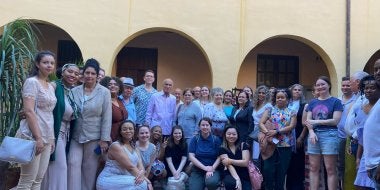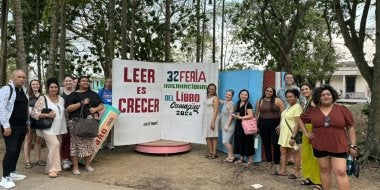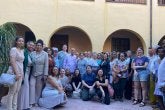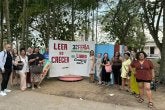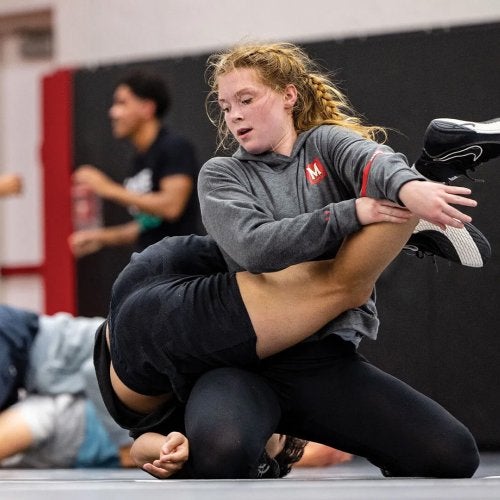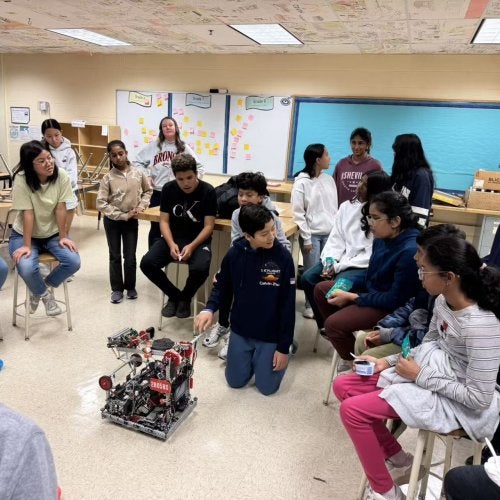
Anastasia Lavrenyuk had been looking forward to spending spring break conducting research in Cuba since before she even began her doctoral studies in international education policy at the University of Maryland. As an international student from Russia, she was fascinated by Cuban-Soviet relations. And having lived in Mexico, she was eager to continue working in Latin America.
This year, Lavrenyuk was among 16 graduate students from the UMD College of Education and School of Public Policy and the George Washington University (GWU) who participated in the UMD-led spring break study abroad fieldwork program in Cuba, which is celebrating its 10th year. The experience is part of the course “Embargoed Exchanges: International Investigations in Cuban Education.” More than 100 UMD graduate students have participated in the program over the last decade–meeting with Cuban educators and scholars, visiting schools and educational sites, and conducting their own research.
While in Cuba, Lavrenyuk and Anna Grigoreva, a fellow UMD international education policy doctoral student, interviewed six Cuban professors who had studied in the Soviet Union. Although the chance to further her research was exciting and rewarding, for Lavrenyuk, one of the most memorable parts of the experience was “the warm reception we received from the Cuban delegation. ... While the primary focus of our trip was exchanging knowledge, our Cuban colleagues also ensured that we always felt welcomed, had good food and had fun. Every day, we had cultural events featuring music and dancing. Initially, only performers danced, but eventually, all of us joined in, including even the shyest among us.”
The chance to build cross-cultural relationships and engage in dialogue is a hallmark of the program. Although the Cuba program is marking one decade as a UMD-led, graduate-level experience, its success in building solidarity and fostering intellectual interchanges between Cuban and U.S. educators and scholars goes back even farther.
The program in Cuba originated in 1994 as an academic exchange in Cuba between U.S. and Cuban education scholars. Sheryl Lutjens–then a faculty member at the Northern Arizona University and now a professor of interdisciplinary and emerging programs at California State University, San Marcos–led the original program in partnership with the Asociación de Pedagogos de Cuba (APC, the Association of Cuban Educators).
In 2015, Taylor Woodman M.A. ’12, Ph.D. ’19–then a doctoral student and now an assistant clinical professor in the UMD College of Education–worked with Lutjens and colleagues at the APC and GWU to reimagine the program in Cuba as a graduate-level study abroad course. Woodman now leads the program in collaboration with colleagues at the APC.
“The U.S. embargo has a direct impact on academic life in Cuba. Scholars have difficulty engaging with U.S. scholarship and sharing their research and findings with U.S. scholars,” said Woodman. “This program is a rare opportunity for Cubans to directly engage in academic discourse with U.S. scholars, share their ongoing research, seek collaborative solutions to pressing educational issues and develop aligned scholarly projects.”
Over the years, Woodman and his colleagues have navigated various logistical challenges–from changing policies toward Cuba under the Obama, Trump and Biden administrations, to the COVID-19 pandemic that forced the program to pivot to a virtual format from 2020 to 2022.
Each year, the group visits different provinces in Cuba, which “provides new insights each and every time that we’re there,” said Woodman. This year, the University of Camagüey in Camagüey, Cuba, hosted the group in collaboration with the APC. Two other College of Education faculty, Ebony Terrell Shockley and Mark Ginsburg, also traveled to Cuba, and served as informal mentors to the students.
The 2024 Cuba visit centered around five major themes, based on the students’ research interests: race, gender and sexuality in education; values education; teacher training; higher education; and education policy related to socioemotional learning. Participants also explored topics including research ethics and issues of power and privilege in their roles as U.S. researchers in global contexts. Woodman coordinates visits to educational sites engaged in work related to the students’ individual research questions.
“My goal is that their research goes beyond our class and helps complicate or add to the narrative of U.S.-Cuba educational practice and collaboration,” said Woodman. His students have written peer-reviewed journal articles and book chapters, presented their research at academic conferences, and incorporated their Cuba-based research into their dissertations.
During their nine days in Cuba this year, the group met with two university presidents and 45 Cuban educators, as well as educational policy representatives and scholars. They visited 12 rural and urban schools and educational sites, ranging from early childhood education to adult learning.
For Lindsey Allen, a doctoral student in teaching and learning, policy and leadership, language, literacy, and social inquiry specialization, the most memorable moment during this year’s program came during a visit to an arts-centered secondary school. “A colleague and I were able to sit in this gorgeous courtyard, talking to students about their experiences,” she said. “Slowly, other cohort members joined, as well as more Cuban students. It was simple. Joyful. Real.”
The Cuba visit is often a life-changing experience with profound effects on participants’ lives, careers and worldviews, long after students finish their graduate work. Michael Anthony Goodman Ph.D. ’20 credits his experience in Cuba in 2017 with shaping his perspective in his role as an assistant professor of practice in higher education leadership and policy at the University of Texas at Austin. “As a professor, I cannot detangle my work in higher education policy from that of international education and policy,” said Goodman. “My opportunity to experience UMD's Cuba program informs so much of that perspective and approach, and it shows up in how I design courses and even some of my research.”
In June, Woodman will present findings at the Latin American Studies Association’s annual conference in Bogotá, Colombia, based on interviews he and three UMD doctoral students, Timothy Ford Bryson, Juanita Ariza and Sarah Pickens, conducted with 12 long-standing APC members. These interviews highlight the Cuban educators’ views of the program’s importance over the past 30 years in terms of academic diplomacy and solidarity building.
“It’s important for educators to work across language, cultures and political and geographic space,” said Woodman. “This exchange allows us to think about alternative approaches to education that we can take back into U.S. classrooms, educational policy environments, graduate studies, research and advocacy initiatives.”
